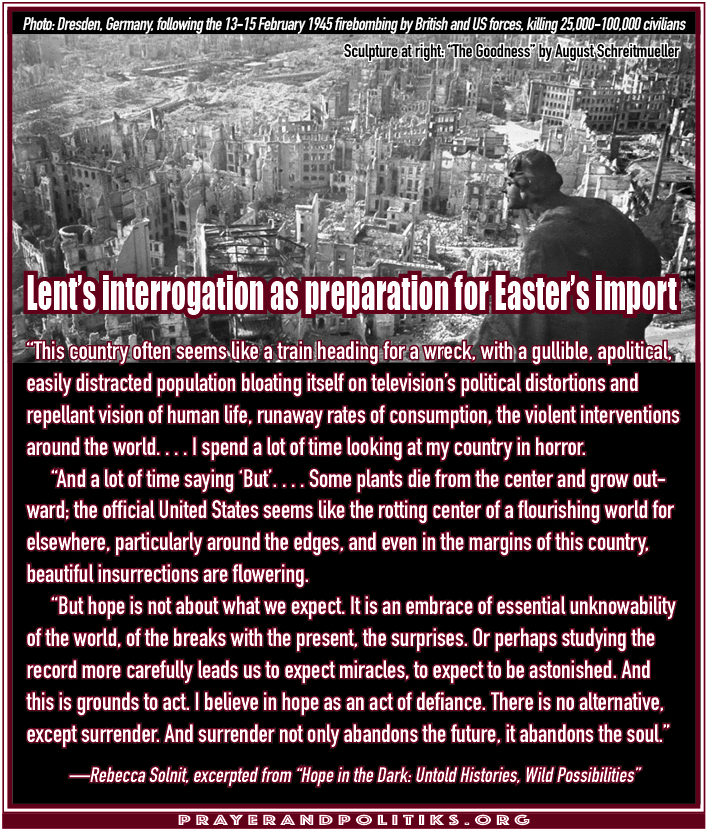Compiled by Ken Sehested
§ No king is saved by the size of his army; no warrior escapes by his great strength. A horse is a vain hope for deliverance; despite all its great strength it cannot save. —Psalm 33:16-17
§ You can no more win a war than you can win an earthquake. —Jeanette Rankin
§ What shall we do, we who are at war but are asked to pretend we are not? —Marvin Bell
§ War is as outmoded as cannibalism, chattel slavery, blood feuds, and dueling, an insult to God and humanity . . . and a daily crucifixion of Christ. —Muriel Lester
§ One of Bonhoeffer’s former theology students wrote him a letter from the Eastern front which tells of liquidating fifty prisoners of war in single day, of shooting women and children in the back of the neck for sneaking food to the captured and of burning down entire villages. All these actions, which by Nuremberg standards would qualify as war crimes, are defended in anxious tones by Bonhoeffer’s young correspondent as having been committed because of “military necessity.” —George Hunsinger
§ An inquirer came to Tertullian, an early leader in the Christian church, and said: "I would be Christian, but after all, I do have to live, don't I?" "Do you?" the old man asked.
§ A church that is not able to take a firm stand against war is not a church which deserves to be believed. —Harvey Cox
§ Peacemaking is not an optional commitment; it is a requirement of our faith. We are called to be peacemakers, not by some movement of the moment, but by our Lord Jesus. —“The Challenge of Peace: God's Promise and Our Response: A Pastoral Letter on War and Peace,” US Catholic Bishops statement of 1983
§ How can you say Our Father if you plunge steel into the guts of your brother? Christ compared himself to a hen: Christians behave like hawks. Christ was a shepherd of the sheep: Christians tear each other like wolves. —Dutch theologian Desiderius Erasmus (1466-1536) in his essay “War Is Sweet to Those Who Have Not Tried It”
§. . . to be prepared for war is to be predisposed to war. —minutes from the 1952 Southern Baptist Convention annual meeting, report by its Social Service Commission
§ Show me who makes a profit from war and I will show you how to stop war. —Henry Ford
§ I was in the East End of London (a working-class quarter) yesterday and attended a meeting of the unemployed. I listened to the wild speeches, which were just a cry for “bread! bread!” and on my way home I pondered over the scene and I became more than ever convinced of the importance of imperialism. . . . My cherished idea is a solution for the social problem, i.e. in order to save the 40,000,000 inhabitants of the United Kingdom from a bloody civil war, we colonial statesmen must acquire new markets for the goods produced in the factories and mines. The Empire, as I have always said, is a bread and butter question. If you want to avoid civil war, you must become imperialists. —Cecil Rhodes, the millionaire British capitalist for whom Rhodesia was named
§ In time of war the first casualty is truth. —Boake Carter
§ When the rich wage war it is the poor who die. —Jean-Paul Sartre
§ Every gun that is made, every warship launched, every rocket fired signifies, in the final sense, a theft from those who hunger and are not fed, those who are cold and are not clothed. This world in arms is not spending money alone. It is spending the sweat of its laborers, the genius of its scientists, the hopes of its children. —U.S. President Dwight D. Eisenhower
§ I will save them—not by bow, sword or battle, or by horses and horsemen, but by the LORD their God. — Hosea 1:7
§ When wars are fought, thousands of trained soldiers are mobilized, highly trained experts and sophisticated technologies are activated. When peace is to be created, the world sends one person to shuttle back and forth between some of the parties. —Jan Oberg, director of Sweden's Transnational Foundation for Peace and Future Research
§ Those who died in war were better off than those who died later, who starved slowly to death, with no food to keep them alive. —Lamentations 4:9
§ O, that we who declare war against wars, and acknowledge our trust to be in God only, may walk in the light, and therein examine our foundation and motives in holding onto money! May we look upon our estates, our treasures, the furniture of our houses, and our garments, and try whether the seeds of war have nourishment in these, our possessions. —John Woolman, 18th century Quaker
§ An eye for an eye only ends up making the whole world blind. —Mohandas Gandhi
§ We have grasped the mystery of the atom and rejected the Sermon on the Mount. . . . Ours is a world of nuclear giants and ethical infants. —General Omar Bradley
§ The past is prophetic in that it asserts loudly that wars are poor chisels for carving out peaceful tomorrows. One day we must come to see that peace is not merely a distant goal that we seek, but means by which we arrive at that goal. —Martin Luther King Jr.
§ In modern warfare, seven children die for every soldier. —1993 United Nations report
§ It must now be obvious that we cannot live in a free, pluralistic society, enjoying our CD players and eating at Burger King and driving cars from every point on the globe without realizing that there must be a cost for such freedom. . . . —1991 letter during the Gulf War to the editor, Memphis, TN, from a military surgeon
§ The object of war is not to die for your country but to make the other bastard die for his. —General George Patton
§ When I pray for peace, I pray not only that the enemies of my own country may cease to want war, but above all that my own country will cease to do the things that make war inevitable. —Thomas Merton
§ War is not an accident. It is the logical outcome of a certain way of life. If we want to attack war, we have to attack that way of life.” —A. J. Muste
§ Some trust in chariots and some in horses, but we trust in the name of the Lord our God. — Psalm 20:7
§ The only way I know to pluck from the hearts of enemies their desire to destroy us is to remove from their lives the sense that, for their own physical and spiritual survival, they must. —novelist David James Duncan
§ Beware the leader who bangs the drums of war in order to whip the citizenry into a patriotic fervor, for patriotism is indeed a double-edged sword. It both emboldens the blood, just as it narrows the mind…. And when the drums of war have reached a fever pitch and the blood boils with hate and the mind has closed, the leader will have no need in seizing the rights of the citizenry. Rather, the citizenry, infused with fear and blinded with patriotism, will offer up all of their rights unto the leader, and gladly so. How do I know? For this is what I have done. And I am Caesar. —William Shakespeare
§ War is good for the economy like cannibalism is nutritious. —George Bernard Shaw
§ I am sick and tired of war. Its glory is all moonshine. It is only those who have neither fired a shot nor heard the shrieks and groans of the wounded who cry aloud for blood, for vengeance, for desolation. War is hell. —General William Tecumseh Sherman
§ Why of course the people don't want war. Why should some poor slob on the farm want to risk his life in a war when the best he can get out of it is to come back to his farm in one piece? . . . Voice or no voice, the people can always be brought to the bidding of the leaders. That is easy. All you have to do is tell them they are being attacked, and denounce the pacifists for lack of patriotism and exposing the country to danger. It works the same in any country. —Nazi leader Hermann Goering
§ If your enemy is hungry, give him food to eat; if he is thirsty, give him water to drink. — Proverbs 25:21-22
§ Every piece of this [war] is bullshit. They call this war a cloud over the land. They made the weather, then they stand in the rain and say, “Shit, it’s raining.” —Renee Zellweger, as Ruby Thewes, in the movie "Cold Mountain"
§ Give in to your anger. With each passing moment, you make yourself more my servant. —Emperor Palpatine in “Star Wars”
§ Our strategy should be not only to confront empire, but to lay siege to it. To deprive it of oxygen. To shame it. To mock it. With our art, our music, our literature, our stubbornness, our joy, our brilliance, our sheer relentlessness—and our ability to tell our own stories. Stories that are different from the ones we’re being brainwashed to believe. —Arundhati Roy, Indian novelist
§ According to U.N. Development Fund for Women, 15 percent of wartime casualties in World War I were civilians. In World War II, 65 percent were civilians. By the mid ’90s, over 75 percent of wartime casualties were civilians. . . . In Iraq, for every dead U.S. soldier, there are 14 other deaths, 93 percent of them are civilian. . . . —Sr. Joan Chittister
§ Between 1800 and 1934, U.S. Marines staged 180 landings abroad. And that’s not even counting the Indian wars the army was fighting every year until 1890. —Max Boot
§ We do not wage war as the world does. The weapons we fight with are not the weapons of the world. —2 Corinthians 10:3-4
§ As a minister, he steadfastly refused to mix politics and religion. In the pulpit, he stayed away from issues such as gay rights, abortion, and war, preferring instead to teach what Jesus taught—love your neighbor, help the less fortunate, forgive others because you have been forgiven, and follow God’s laws. —description of Rev. Schroeder, a character in John Grisham’s novel, The Confession
§ People are a lot more comfortable with a Predator [drone] strike that kills many people than with a throat-slitting that kills one. —Vicki Divoli, former CIA lawyer
§ Iconic journalist Walter Cronkite got his first significant reporting job when he was hired in 1937 by United Press, where he soon was covering the war in Europe. Hugh Baillie, president of UP, urged his reporters to “get the smell of warm blood into their copy.” —Douglas Brinkley
§ I remembered Bayard Rustin, a conscientious objector who had served time in prison during the Second World War and then became a leader in the civil rights movement, saying that being a pacifist is one-tenth conscientious objection and nine-tenths working to do away with the things that make for war. —David Hartsough
§ When you ask young men to kill people for a living, it takes a whole lot of effort to rein that in. —Reserve Marine Lt. Col. Paul Hackett
§ Christians whose loyalty to the Prince of Peace puts them out of step with today’s nationalistic world, because they are willing to love their nation’s friends but not to hate their nation’s enemies, are not unrealistic dreamers who think that by their objections they will end all wars. On the contrary, it is the soldiers who think they can put an end to wars by preparing for just one more. —John Howard Yoder
§ Recalling cynically those politicians who gush on about gallantry and sacrifice in warfare, E.B. Sledge, a veteran of the World War II campaigns at Peleliu and Okinawa wrote, “The words seemed so ridiculous. Only the flies benefited.”
§ It is directly contrary to the nature of Christ Jesus . . . that throats of men should be torne out for his sake. —17th century religious liberty champion Roger Williams
§ We used to wonder where war lived, what it was that made it so vile. And now we realize that we know where it lives, that it is inside ourselves. —Albert Camus
§ I am a violent man learning to be nonviolent. —Caesar Chavez
§ When all the men of war are killed / And flags have fallen into dust / Your cross and mine will tell men still / He died on each for both of us / That we might become the brothers of God / And learn to know the Christ of burnt men / And the children are ringing the bells of Gethsemani. —Thomas Merton
§ We seem always ready to pay the price for war. Almost gladly we give our time and our treasures—our limbs and even our lives—for war. But we expect to get peace for nothing. —Peace Pilgrim
§ If everyone demanded peace instead of another television set, then there’d be peace. —John Lennon
§ War is not inherent in human beings. We learn war and we learn peace. The culture of peace is something which is learned, just as violence is learned and war culture is learned. —Elise Boulding
§ God is in the cries heard under the rubble of war. God is in the debris of wasted opportunity and lives. And God is with us, if we are with them. —Bono, lead vocalist for U2
§ President Bush should “blow them [terrorists] away in the name of the Lord.” —Rev. Jerry Falwell in a 2004 CNN interview
§ Peace is love that is passed on from generation to generation. —Clifford, age 8, quoted in Seeds of Peace
§ If we cannot pray for the time to come when God’s almighty arm will hold back warring armies, then it is a mockery to believe that God makes all things new. —Christoph Friedrich Blumhardt
§ Long have I held that war is an enormous crime; long have I regarded all battles as but murder on a large scale. —Charles Spurgeon, noted 19th century British Baptist pastor dubbed the “Prince of Preachers”
§ Fascism believes neither in the possibility nor in the utility of perpetual peace. It thus repudiates the doctrine of Pacifism—born of a renunciation of the struggle and an act of cowardice in the face of sacrifice. War alone brings up to their highest tension all human energies. —Italian dictator Benito Mussolini
§ My sincere view is that the commitment of our forces to this fight was done with a casualness and swagger that are the special province of those who have never had to execute these missions—or bury the results. —Marine Lt. Gen. Gregory S. Newbold, former operations officer for the Joint Chiefs of Staff, who resigned four months before the 2003 invasion of Iraq
§ Being a pacifist between wars is as easy as being a vegetarian between meals. —Ammon Hennacy
§ We kill at every step, not only in wars, riots, and executions. We kill when we close our eyes to poverty, suffering, and shame. —Eberhard Arnold
§ Defending U.S. military censors’ refusal to release video footage showing Iraqi soldiers being cut in half by cannon fire from helicopters, a Pentagon senior official said: “If we let people see that kind of thing, there would never again be any war.” —quoted in The Christian Century, 11 December 1991
§ War is a racket. It always has been. It is possibly the oldest, easily the most profitable, surely the most vicious. —Major General Smedley Butler, US Marines (retired)
§ You have heard it said of old, an eye for an eye, and a tooth for a tooth: but I say unto you, that you resist not evil with evil; but whosoever shall smite you on your right cheek, turn to him the other also. — Matthew 5:38-42
§ The spirit of this country is totally adverse to a large military force. —former US President Thomas Jefferson
§ Every war when it comes, or before it comes, is represented not as a war but as an act of self-defense against a homicidal maniac. —George Orwell
§ Here’s what I think the truth is: We are all addicts of fossil fuels in a state of denial. And like so many addicts about to face cold turkey, our leaders are now committing violent crimes to get what little is left of what we’re hooked on. —Kurt Vonnegut
§ See that none render evil for evil to any person. — I Thessalonians 5:15
§ Force is as pitiless to the man who possesses it, or thinks he does, as it is to its victims; the second it crushes, the first it intoxicates. The truth is, nobody really possesses it. —Simone Weil
§ And when it was claimed / The war had ended, it had not ended. —Denise Levertov
§ Peace plans its strategy and encircles the enemy. / Peace marshals its forces and storms the gates. / Peace gathers its weapons and pierces the defense. / Peace, like war, is waged. / But Christ has turned it all around: / the weapons of peace are love, joy, goodness, long-suffering; / the arms of peace are justice, truth, patience, prayer; / the strategy of peace brings safety, welfare, happiness; / the forces of peace are the sons and daughters of God. —Walker Knight
§ What causes wars? Is it not your longings and lusts? You desire and do not have; so you kill. And your covet and cannot obtain, so you wage war. —James 4:1-2
§ The sword of murder is not the balance of justice. Blood does not wipe out dishonor nor violence indicate possession. —19th century author Julia Ward Howe
§ War is God’s way of teaching Americans geography. —American writer and satirist Ambrose Bierce
§ Then I saw a new heave and a new earth. And I heard a loud voice saying, “See, the home of God is among mortals. God will wipe away every tear, and death shall be no more, neither shall there be mourning nor crying nor pain any more, for the former things have passed away.” —Revelation 21:1-4
©Ken Sehested @ prayerandpolitiks.org


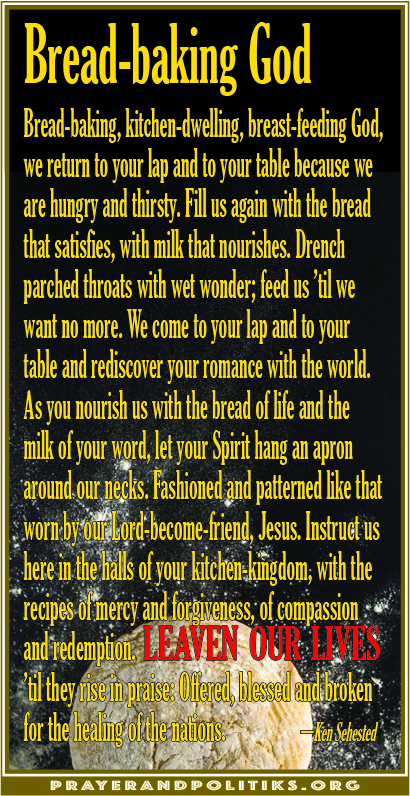 s Day.
s Day.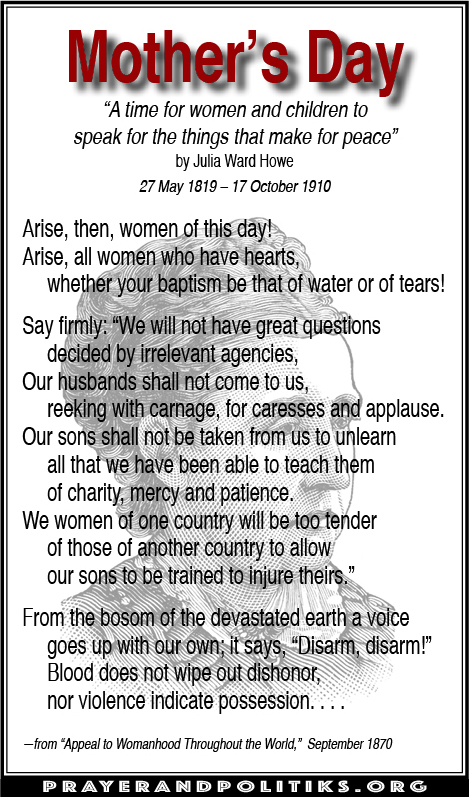 days are surely coming when they will say, ‘Blessed are the barren, and the wombs that never bore, and the breasts that never nursed.’” The context of his statement is a warning against the destruction to come, basically saying “thank God you don’t have children who will suffer this fate.” But by implication, in the age to come, such as these will have their shame turned to fecund praise (Luke 23:29).
days are surely coming when they will say, ‘Blessed are the barren, and the wombs that never bore, and the breasts that never nursed.’” The context of his statement is a warning against the destruction to come, basically saying “thank God you don’t have children who will suffer this fate.” But by implication, in the age to come, such as these will have their shame turned to fecund praise (Luke 23:29). woman in Nashville carried a sign saying, “Sacrifice the Weak.”
woman in Nashville carried a sign saying, “Sacrifice the Weak.”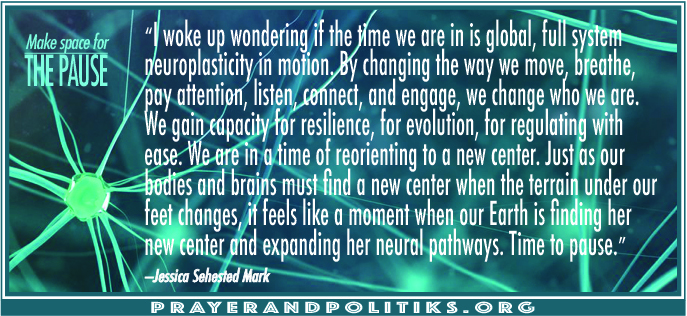 employer-sponsored coverage.
employer-sponsored coverage. harm's way.
harm's way.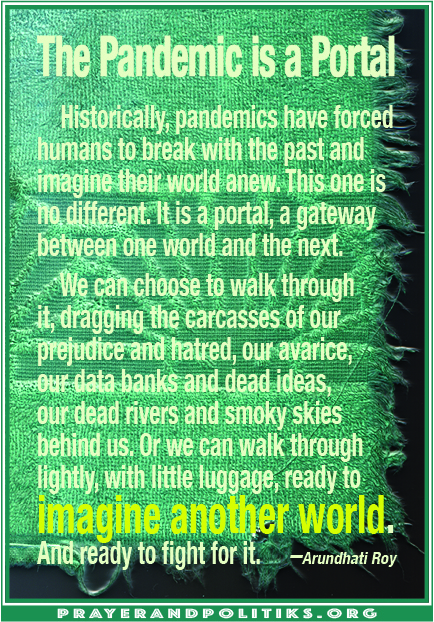 sion that human value is calculated on usefulness and productivity. Having that fantasy stripped away is especially painful for those of us raised in a ethical universe shaped by capitalism. The makers find it impossible to believe we don’t get extra cookies; and that we don’t get to disparage the takers. What kind of moral mismanagement is this!?!
sion that human value is calculated on usefulness and productivity. Having that fantasy stripped away is especially painful for those of us raised in a ethical universe shaped by capitalism. The makers find it impossible to believe we don’t get extra cookies; and that we don’t get to disparage the takers. What kind of moral mismanagement is this!?! coordination. “Apocalypse” is a tricky word. It evokes memory of the surreal 1979 film (“Apocalypse Now”) by Francis Ford Coppola and the mind-bending roles of Brando and Sheen and Duvall. Not to mention the glut of more recent dystopian movies and television shows featuring zombies and the trail of gore they dramatize.
coordination. “Apocalypse” is a tricky word. It evokes memory of the surreal 1979 film (“Apocalypse Now”) by Francis Ford Coppola and the mind-bending roles of Brando and Sheen and Duvall. Not to mention the glut of more recent dystopian movies and television shows featuring zombies and the trail of gore they dramatize. stars of heaven and threw them to the earth. Then the dragon stood before the woman to devour her child as soon as it was born.
stars of heaven and threw them to the earth. Then the dragon stood before the woman to devour her child as soon as it was born.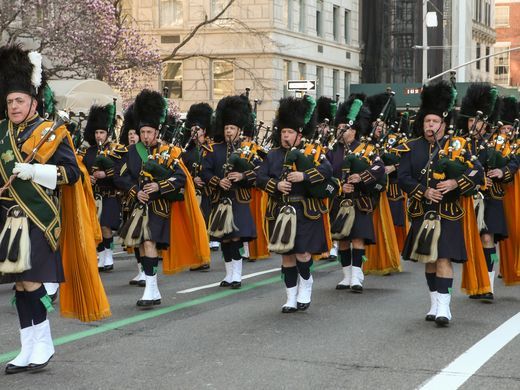 ¶ St. Patrick Day festivities are many and varied. Even in my distance from all things Irish while growing up in a small tex-mex town in West Texas, and a slightly larger town down the Cajun swamps of South Louisiana, wearing green was a thing on 17 March.
¶ St. Patrick Day festivities are many and varied. Even in my distance from all things Irish while growing up in a small tex-mex town in West Texas, and a slightly larger town down the Cajun swamps of South Louisiana, wearing green was a thing on 17 March.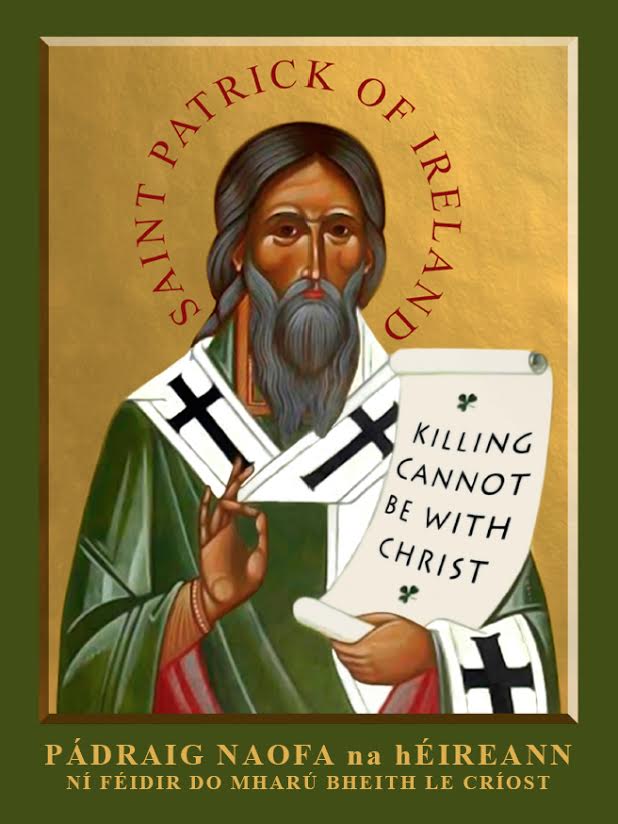 pedal harmonium, Gerry O'Beirne, Mathew Manning, Moya O'Grady and David O'Doherty at Powerscourt House, 2009. Shaun Davey adapted the words of St Patricks Breastplate as translated by Kuno Meyer in 1990.
pedal harmonium, Gerry O'Beirne, Mathew Manning, Moya O'Grady and David O'Doherty at Powerscourt House, 2009. Shaun Davey adapted the words of St Patricks Breastplate as translated by Kuno Meyer in 1990. another million, reducing the country’s population by nearly 25%.
another million, reducing the country’s population by nearly 25%. nediction.
nediction. the music had a calming effect, just as I had hoped.
the music had a calming effect, just as I had hoped.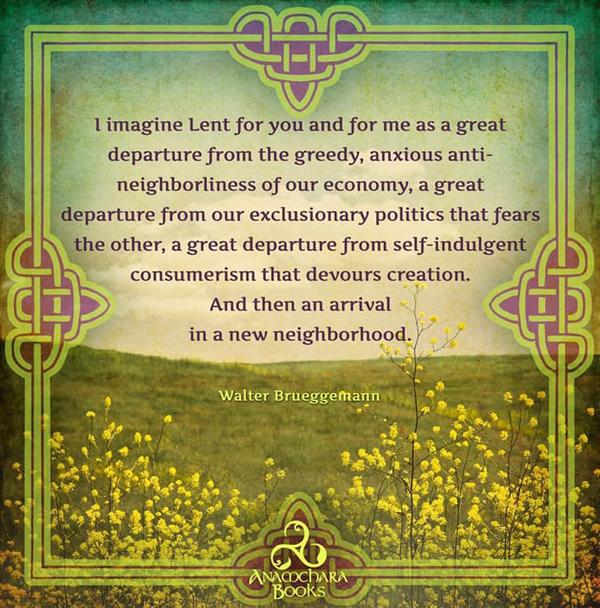 skepticism, if not disgust.
skepticism, if not disgust.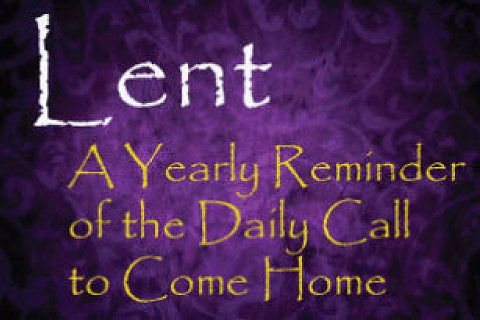 had decided was the right thing to do. But I also sensed that it would prove to be our undoing. There was no turning back now. It felt for all the world like an impending death.
had decided was the right thing to do. But I also sensed that it would prove to be our undoing. There was no turning back now. It felt for all the world like an impending death.